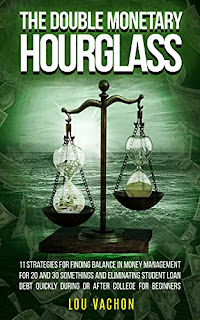Genre: Self-Help,
Finance
Description:
“Do you find yourself worrying about what you’re going to do once you
get out of college?
Even if you do manage to get a good job, how do you plan on paying off
your student loans? And what about buying a house, getting a reliable car, and
starting a family?
Entering the world of ‘adulthood’ certainly comes with a lot of extra
requirements, most of which demand sizable financial investment, but it doesn’t
have to be a big scary ordeal. In fact, pursuing all of these goals can even
become the most liberating and freeing feeling of your life.
70% of college graduates enter the workforce with over $30,000 in
debt. But this doesn't have to be you -- you don't have to become part of yet
another statistic.
Proper money management is the byproduct of a mindset shift. Your
relationship with money is the foundation of your financial success, and with the
right tools, techniques, and practices, you can achieve the monetary abundance
you’ve always dreamt of.”
Author:
Lou Vachon is a real estate entrepreneur and financial advisor. He
teaches courses through some online educational platforms such as Udemy and
Teachable on subjects related to real estate investment and finance. This is
his sixth book.
Appraisal:
The subtitle of this book, “11 strategies for finding balance in money
management for students, and eliminating student loan debt quickly during or
after college for beginners,” means that I’m definitely not the target reader,
missing by several decades. However, it also means that from my own experiences
and observations I might be in a better place than the target reader to gauge
the book’s potential usefulness for those the book is aimed at.
My take is that many of the ideas presented are excellent. The ideas
proposed to figure out your finances, both where you stand and a budget, were
good. How to approach goal setting and prioritization of those financial goals were
also very good. He had some good ideas on how a person could identify and
monetize their talents and various ways to build their income, in some cases
establishing a passive income that once put in place wouldn’t be a time drain,
but would continue to provide income.
However, there are places where I think he
overstates things, for example I think he overestimates the financial benefit
of a blog although I’ll concede that the specific niche the blog falls in will
make a big difference. His attitude that comes through is that a person should
care more about becoming as rich as possible, focusing all of their time on
doing those things that maximize their odds of doing well financially, but
doesn’t set you up for a very well balanced life. (Choosing or discarding
friends based on how that help or hinder you finances even makes an appearance along
with the thought that any decision should be based only on how and whether it
benefits you. Other people don’t seem to matter in his mind.) Another example where
I think he overstated things was implying that a person who started doing the
things he proposed would see a significant improvement in their financial
standing in a month. He’s delusional if he really believes that.
I also found myself in some cases unclear as
to the point he was trying to make. For example, in the section on goals,
specifically what are called SMART goals he was discussing that they should be
specific. He then gave an example of getting a car as a goal that wouldn’t be
specific enough, suggesting that a specific make and model would be a better
goal. Then shortly after he lists “buying a house” as another potential goal
and saw that as specific enough. I guess the difference in a falling down shack
in the slums and a nice three bedroom in a ritzy suburb is about the same
whereas the difference between a Ford and BMW is of major significance.
As I said in the beginning, some of the
advice here is good. But there is enough that is questionable that I won’t be
buying a copy for my 20 or 30 something friends and family or advising them to
check it out.
Buy now
from: Amazon US Amazon UK
Format/Typo
Issues:
No significant formatting issues although the number of instances of
grammar issues or the use of a wrong word that I found were more than I like to
see, but not quite enough to decrease the rating.
Rating: ***
Three Stars
Reviewed
by: BigAl
Approximate
word count: 25-30,000 words


No comments:
Post a Comment